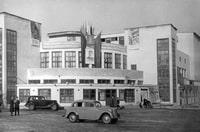You are here
History of Uyghur theater in Almaty.

Romantic getaway in Almaty.
“Bows are an integral part of the performance. The tail must remain from the comet in the hands of the viewer”
Maya Plisetskaya.
Take an excursion environs Almaty.
Its biography started in 1934 wit the musical drama “Anarkhan”. Basic performances of the theatre are “Nazugum”, “Lashman”, “Secrets of Mukams”, “Bilal-Nazim”, “Garib and Sanam”, “Sadyr Paluan”, as well as: “Doctor willy-nilly” of J-B. Moliere, “Othello” of W. Shakespeare, “White Ship” of C.Aitmatov, “Aiman-Sholpan” of M.Auezov, “Kyz-Zhibek” of G.Musrepov, “Foreigner” of I.Khurmusli. Uyghur Musical Comedy Theater, State Republican (1964; until 1967, musical and drama theater).
It is located on 83 Nauryzbay Batyr Street (the scene has been operating since 1969, the former Dzerzhinsky Street, the Dzerzhinsky NKVD club, 1935, architect I. Burovtsev, a monument of architecture, history). The theater with 480 seats, was under reconstruction in 1994 - 2002.
In the early 60s, the theater moved to Alma-Ata (since 1962, in the building of the Kazakh Concert, at 63 Pushkin St.). Architectural monument. He was awarded the Badge of Honor order (1984). In 2005, on the eve of the 70th anniversary, the theater was named in honor of Kuzhamyarov Kuddus (1918 - 1994), composer, People's Artist of the USSR, USSR State Prize laureate, professor and rector of the Conservatory, the author of the first Soviet Uighur opera Nazugum and the ballet Chin-Tomur.
The first professional theater in the history of the Uyghur people of Kazakhstan, opened in 1934 with the musical drama Anarkhan by D. Asimov and A. Sadyrov. The theater was formed in difficult historical conditions, sometimes full of contradictions in state policy, in ideology, in the most severe repressions of the Soviet Stalin era.
The modern years of the reconstruction of the theater building turned out to be very difficult for the theater, since a huge creative team was without a room. Despite the difficult economic, material and moral costs during the reconstruction of the theater building, he continued to work, exploring new horizons of art (director M. Akhmadiev and chief director Y. Shamiev).
Returning to history, in 1941 - 1961 The Uyghur Regional Music and Drama Theater relocated to the village of Chilik, Alma-Ata region. “During the war, the Uyghur Theater lived on wheels. It served four large areas: Enbekshi-Kazakh, Chilik, Uigur, Dzharkent, separated by distances of 100 - 150 kilometers.
During this time, the theater put on thirteen one-act plays on the defense theme, and two concerts of a defensive nature are shown. Over the years, the theater’s team has collected more than 50 thousand rubles for the country's defense ”(quote from the report of the head of the theater department at the Council of People's Commissars of the Kazakh SSR K. Rozin and the main director of the theater A. Marjanov for 1944).
In its best performances, the musical-drama theater created images of great social significance, the characters of strong people who uncompromisingly enter the struggle for justice, for the interests of the people, for social transformations, for national independence.
These were the heroic and romantic images of Sadyr Palvan, Makhmut Kuzhamyarov, Nazugum, Lutpulla, Bilal Nazim, Abdulla Rozybakiev, the psychologically finely designed images of Anarkhan, Sanam, Aimkhan, Amanis, passionate advocates of truth and justice, the farm laborer Sait Khap and the courtier Over the years, a wonderful galaxy of stage masters has grown in the theater.
These are the national artists of Kazakhstan - A. Shamiev, S. Sattarova, M. Semyatova, M. Bakiev, R. Ilakhunova, Z. Akbarova, N. Mametova, K. Abdrasulov, M. Akhmadiev, honored artists of the Republic of Kazakhstan - Zh. Asimov, G. Dzhalilov, H. Ilieva, M. Zainaudinov, A. Supiev, R. Tokhtanova, A. Akbarov, T. Bakhtybaev, S. Israilov, M. Rakhmanova, K. Zakirov, G. Saitova, R. Sattarova, R. Makhpirova, M.Mametbakiev, A.Akbarova, Honored Art Workers of the Republic of Kazakhstan P. Ibragimov, I. Massimov, A. Kadyrov, Honored Worker of the Republic of Kazakhstan - A. Aysaev.
The theater has a fruitful work of the vava-folk ensemble “Nava”, the vocal and choreographic ensemble “Sada”, the youth-pop ensemble “Yashlik”, the choreographic ensemble “Rukhsara” and the drama troupe. In 2003, on the eve of the anniversary of M. Utemisov, the play “Makhambet” by the Kazakh playwright A. Tarazi was written to the theater.
The performance on the stage of the theater became a bright event in the theatrical life of our republic. The director S. Asylkhanov, together with the choreographer G. Saitova, made extensive use of movement plastics, dancing, music, and dumb, mise-en-scene scenes filled with deep meaning.
The team of the Uyghur Theater still has many undisclosed actor identities, new theater stars with a huge wealth of artistic and expressive means. This is evidenced by the participation of the theater in many international, regional and republican theater festivals, where its best performances, its talented artists were awarded the titles of laureates of festivals and diplomas.
Musical comedy theater participation in the IX international festival, in the All-Union festival of visual art "Media Wave-98" in Hungary, then in Turkey, China, Finland, Switzerland, England, also in experimental productions in Cairo (in the "Egypt" festival in 1997 ), in Moscow (1981) and other foreign countries, showed vivid evidence of the expansion of the theater’s borders and its entry into the international arena.
Literature:
Matveeva L.A. Palace of Culture AKHBK. The building of the Kakhakh drama theater. M.O. Auezova -In the book:
Monuments of history and culture of Almaty. Catalog of documents of the Archives and Documentation Management and the Central Administration of the City of Almaty. - Almaty, Oner Publishing House, 2003, ss. 120 - 121, pp. 90 - 91;
Malinovskaya E.G., Proskurin V.N. Theater of Young Spectators. - In the book :
Collection of historical and cultural monuments of the city of Almaty. - Almaty, Kazakh Encyclopedia LLP, 2006, pp. 306-308;
Manannikova L.B. I come from the Youth Theater, Almaty, 2010, p. 424; Sats N. Novels of my life, Prince 1-I, M., 1984, p. 496
Authority:
Vladimir Proskurin (Berlin).







